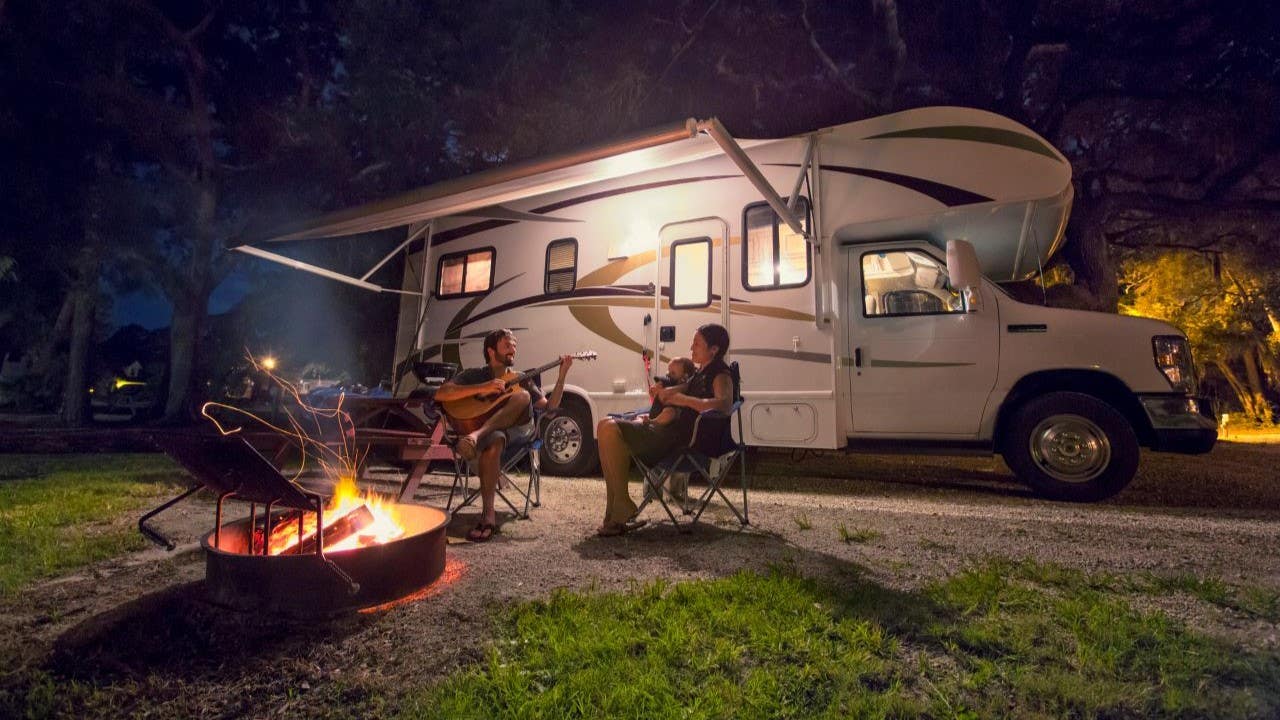Is buying an RV worth it, or should you just rent one?




Key takeaways
- Buying an RV makes sense if you like taking frequent, spontaneous trips every year.
- Renting is a good option if you’re planning ahead for a vacation you take every couple of years.
- If you decide to buy, consider buying used to reduce the purchase price.
More than 8.1 million U.S. households currently own an RV, according to the RV Industry Association. However, if you aren’t using it for regular getaways, the benefits may not outweigh the hefty costs. When you buy an RV, you must also factor in insurance, maintenance, storage and other costs — something you don’t have to worry about when renting.
But renting may be more cost-effective if you only plan to hit the open road every now and then and want a more turnkey solution. It’s important to consider the ins and outs of both options when making a choice, including your budget, how often you plan to use the vehicle, your credit profile and your long-term financial goals.
| Buying an RV | Renting an RV |
|---|---|
| Freedom to hit the road at any moment | Requires planning ahead to reserve an RV |
| Ability to customize it to your needs and taste | No customization available, but you can rent a different type each time |
| Storage required, which can add an extra cost | May include mileage or usage restrictions |
| The cost of maintenance, repairs and accessories can add up | Many rentals come fully stocked with accessories and must-haves, like bedding and cookware |
| Best for frequent use | Best for infrequent use |
How much is an RV? Renting vs. buying
The cost of purchasing or renting an RV depends on a variety of factors, including the type, age and features. You may incur a lot of extra costs besides the RV purchase price that are included in the nightly rate on a rental.
| Type of RV | Cost to rent per night | Average cost to buy (new) |
|---|---|---|
| Class A motorhome | $313 | $75,000 to $250,000 |
| Class B camper van | $228 | $100,000 to $150,000 |
| Class C motorhome | $214 | $65,000 to $150,000 |
| Travel trailer or fifth-wheel | $113 | $20,000 to $65,000 |
| Pop-up camper | $90 | $10,000 to $25,000 |
| Toy hauler | $143 | $30,000 to $70,000 |
| Source: Go RV Rentals annual report, RVIA |
Be sure to consider the additional vacation costs associated with any of these options — gas, kitchen supplies, park fees and insurance should all factor into your decision. These extra costs can add up quickly, whether you rent or buy. If you only want to try an RV once, look for rental companies that include everything in the price so you don’t have to purchase additional equipment.
If you plan to buy, consider looking at used RVs. This can help cut costs if you can’t afford a new model. Just like cars, RVs experience rapid depreciation when you drive them off the lot, so buying used can be a great way to save money. You can also apply for an RV loan, but you may need a down payment if you choose a secured loan option.
What to know about buying an RV
Owning an RV allows you to go on a spontaneous camping trip or make a long trek across the country. However, it also requires regular care and maintenance, and that part isn’t always glamorous. Before committing to the high costs of RV ownership, review the pros and cons.
Advantages
An RV makes an outdoor lifestyle more accessible if you want to travel frequently.
- Convenience: You can go camping at a moment’s notice with a fully-stocked RV that has all of your favorite amenities.
- Cost-effectiveness: If you like taking several vacations per year, owning an RV can be significantly less expensive than renting.
- Customization: You can customize your RV however you want with your own touches of home.
- Simplicity: Aside from reserving a campsite or checking in at your destination, you won’t have to worry about rental contracts or vehicle reservations when you own an RV.

The best RV loans of 2025
If you're considering an unsecured RV loan, review Bankrate's picks for the best RV lenders of the year.
Learn moreDisadvantages
Owning an RV means you’re responsible for all the costs, maintenance, and storage, which can add significantly to your budget. Getting an RV loan also means dealing with an extra monthly payment for up to 15 years, depending on your RV loan term.
- Expensive: Even small RVs have a hefty price tag. Once you own it, you still have to pay for gear, maintenance and annual registration costs. If you qualify for a loan, you’ll need to manage your loan and stay on top of payments.
- Maintenance: If your RV breaks down or needs repairs, you must handle it. You may need to cancel trips if you can’t complete unexpected repairs in time.
- Storage: Your RV needs to be parked somewhere when you aren’t using it. This can mean an extra monthly cost if you don’t have room to store it where you live.
- Depreciation: Like any motor vehicle, the value of your new RV will drop dramatically within the first few years of use. That means you’ll potentially lose money if you put a big chunk down and need to sell it within a few years of purchase. Buying used can offset some of the depreciation.
RV loans from the dealership are typically secured, which means that the vehicle serves as collateral for the loan. However, unsecured RV loans are also an option — your RV doesn’t back the loan, but rates tend to be higher and repayment terms are often shorter. Unsecured RV loans are actually just a type of personal loan.
A personal loan has a lot of benefits over RV loan financing if you’re buying an older, used vehicle. Banks and credit unions typically only want to finance vehicles with sufficient value that they can recoup the loss in the event of repossession. That means it could be tough to secure financing for an old, high-mileage RV.
— Denny Ceizyk Bankrate Loans writer
An unsecured personal loan is approved based on your credit and income — no vetting of your RV is required. You may even get single-digit personal loan rates if you have excellent credit.
What to know about renting an RV
Renting an RV can be a great option if you aren’t fully committed to RV life and only plan to use it occasionally. Keep in mind that the nightly averages above may be higher or lower depending on your location.
For example, the most expensive places for RV rentals are Houston, Austin and San Francisco, according to Go RV Rentals. You’ll spend about $30 less per night renting an RV in Tampa, Florida, San Diego or Phoenix.
Before you start pricing out rentals, consider the pros and cons.
Advantages
Renting is a good idea if you don’t have much experience with RVs or don’t want to be stuck maintaining a large vehicle that will only be used once or twice a year.
- All-inclusive: When you rent from an RV company, they often include all the supplies you will need while camping, such as kitchen tools. They can also help you set up insurance for your rental.
- Flexibility: If you own an RV, you always have to return it home. But when you rent, you may be able to drop it off at your road trip destination and take another mode of transportation (like a flight) home.
- Affordability: The initial cost of buying an RV is quite high. If you just want to use an RV a few times a year or just try it out once or twice, renting is much cheaper.
- Price stability: According to the Go RV Rentals Price Index Report, RV rental prices have remained stable for the past five years, rising only 4 percent since 2020, when Go RV Rentals began collecting data for its reports.
Disadvantages
For frequent travelers, renting an RV means sacrificing the ability to customize your ride and ultimately costs more.
- Long-term costs: If you plan to go RV camping often, the rental costs can add up quickly.
- Lack of spontaneity: You may have to reserve your rental well in advance, especially if you hope to travel during a popular holiday — but if you own an RV, you can hit the road whenever you want.
- More rules: You have to follow the rental company’s rules when renting an RV. You may not be able to take the vehicle on certain roads, and the company may limit your daily mileage.
Is it better to buy or rent an RV?
Buying is almost always better than renting if you take multiple RV trips per year, but it depends entirely on the type of RV you want and the financing terms you can snag. Here’s a vacation day break-even analysis to help with your buy-versus-rent RV decision:
| Type of RV | Cost to buy | Nightly rental costs | Monthly RV payment cost* | How many days to break even with a purchase? |
|---|---|---|---|---|
| Class A motorhome | $100,000 | $313 | $1,213 | 47 days |
| Fifth-wheel | $50,000 | $113 | $607 | 65 days |
| Pop-up camper | $20,000 | $88 | $243 | 33 days |
| *Assumes a 10-year fixed-rate loan at 8 percent |
In the example above, it would take 47 days of rental costs to break even with the cost of an RV loan for a Class A — but this doesn’t take other ownership costs into account (insurance, storage, etc.). Unless you plan on spending nearly seven weeks of every year on the road, it may be better to rent.
If you plan to use an RV past the break-even point, it makes sense to own it. If not, renting could be a better option. However, to get a more accurate break-even, you’ll need to figure in the costs of maintenance and storage if you can’t park your RV at your home.
Bottom line
Whether you decide to rent or buy an RV boils down to your budget, how much of a road warrior you are (or aren’t) and how much you want to customize your RV experience. You also need to determine whether you want the long-term financial commitment of an RV loan, or prefer the flexibility of an RV rental for crosscountry vacations every couple of years.
Why we ask for feedback Your feedback helps us improve our content and services. It takes less than a minute to complete.
Your responses are anonymous and will only be used for improving our website.




